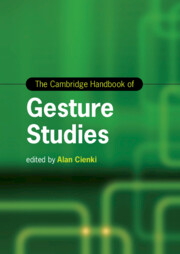Book contents
- The Cambridge Handbook of Gesture Studies
- Cambridge Handbooks in Language and Linguistics
- The Cambridge Handbook of Gesture Studies
- Copyright page
- Contents
- Figures
- Tables
- Contributors
- Introduction
- Part I Gestural Types: Forms and Functions
- Part II Ways of Approaching Gesture Analysis
- Part III Gestures and Language
- 13 The Role of Gesture in Debates on the Origins of Language
- 14 Gesture and First Language Development: The Multimodal Child
- 15 Gesture and Second/Foreign Language Acquisition
- 16 Gesture and Sign Language
- 17 On Grammar–Gesture Relations: Gestures Associated with Negation
- Part IV Gestures in Relation to Cognition
- Part V Gestures in Relation to Interaction
- Index
- References
17 - On Grammar–Gesture Relations: Gestures Associated with Negation
from Part III - Gestures and Language
Published online by Cambridge University Press: 01 May 2024
- The Cambridge Handbook of Gesture Studies
- Cambridge Handbooks in Language and Linguistics
- The Cambridge Handbook of Gesture Studies
- Copyright page
- Contents
- Figures
- Tables
- Contributors
- Introduction
- Part I Gestural Types: Forms and Functions
- Part II Ways of Approaching Gesture Analysis
- Part III Gestures and Language
- 13 The Role of Gesture in Debates on the Origins of Language
- 14 Gesture and First Language Development: The Multimodal Child
- 15 Gesture and Second/Foreign Language Acquisition
- 16 Gesture and Sign Language
- 17 On Grammar–Gesture Relations: Gestures Associated with Negation
- Part IV Gestures in Relation to Cognition
- Part V Gestures in Relation to Interaction
- Index
- References
Summary
Gestures associated with negation have become a well-defined area for gesture studies research. The chapter offers an overview of this area, identifies distinct empirical lines of enquiry, and highlights their contribution to aspects of linguistic and embodiment theory. After relating a surge of interest in this topic to the notion of recurrent gestures (but not restricted to it), the chapter offers a visualization of the widespread geographical coverage of studies of gestures associated with negation, then distils a set of common observations concerning the form, organizational properties, and functions of such gestures. This area of research is then further thematized by exploring distinct chains of studies that have adopted linguistic, cognitive-semantic, functional, psycholinguistic, comparative, and cultural perspectives to analyze the gestural expression of negation. Studies of gestures associated with negation are shown to have played a vital role in shaping understandings of the multimodality of grammar, the embodiment of cognition, and the relations between gestures and sign.
Keywords
- Type
- Chapter
- Information
- The Cambridge Handbook of Gesture Studies , pp. 446 - 474Publisher: Cambridge University PressPrint publication year: 2024
References
- 2
- Cited by

